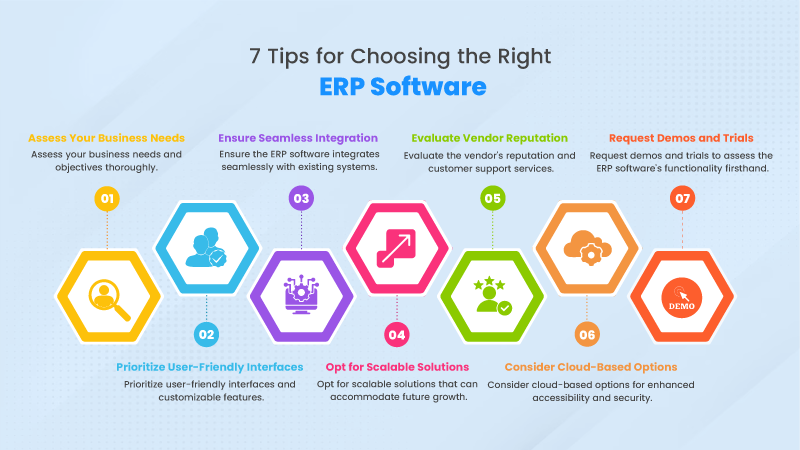How to Choose the Right ERP System? – 7 Tips for Selecting the Right ERP Software
As the digital transformation trend spread throughout all industries, businesses must align with it using the right tools. The abundance of ERP software options, a pivotal element in digital transformation, complicates the decision-making process. Navigating this intricate selection landscape is crucial to avoiding unsuccessful projects, especially given the substantial investments in ERP systems. For those exploring replacements or new ERP software, this blog serves as a valuable guide. Together, let’s identify the ideal ERP software to propel your success into the future.

1. Your ERP Selection Should Fit the Needs of Your Business
Understanding your business needs is pivotal, influencing every decision you make. This significance amplifies when delving into ERP selection. Prior to initiating the ERP selection journey, a thorough analysis of your business processes is essential. Identifying areas that are incomplete or require enhancement sets the stage for an informed decision-making process. In today’s ERP market, a plethora of systems present diverse customization options, offering effective management solutions for your future business processes.
2. Plan an effective budget
As ERP software constitutes a significant investment, meticulous budget planning is imperative. While conventional wisdom might suggest that the priciest option is the finest, this perspective should be reconsidered during your ERP selection. Instead, adhere to our initial advice: opt for the system that delivers the maximum value for your business, focusing on what suits your business needs best.
3. Choose a Flexible ERP for Your Future
When businesses invest in ERP systems, they anticipate enhanced productivity, time efficiency, and cost savings in their operations. However, a system incapable of adapting to evolving processes with advancing technology may hinder these expectations. To avoid this, recognize that an ERP system is a dynamic structure and should evolve with your business. Prioritize flexible and scalable ERP software during your selection, ensuring it can adapt to your growing needs. Additionally, opting for a system that allows industry-specific customizations can provide additional advantages.
4. Your ERP System Should Adapt to New Technologies
Every day, technological advancements simplify various aspects of our lives. In our fast-paced world, any delays in work processes can be frustrating. Ensuring that your ERP system aligns with both current and future technologies is crucial. A system capable of staying abreast of developments, including those in Industry 4.0, contributes to sustaining your success.
5. Choose The Right Implementation Partner
Selecting an ERP marks the first step of the digital transformation journey. Subsequently, you’ll embark on an extensive journey encountering multiple stages and challenges. Having a supportive Microsoft Dynamics Partner becomes crucial to avoid navigating the journey alone. Seeking feedback from businesses that have previously implemented the Microsoft Dynamics ERP software you are about to select.
6. Choose a System Compatible with Your Existing Software
If you’re content with existing business software aside from ERP systems, choosing a highly integrative ERP software is vital to maximize your investment. For instance, if you’re using a CRM system and prefer to retain it, ensure the ERP system you’re purchasing supports seamless integration.
7. Optimize Your Business with Industry-Tailored ERP Systems
In every sector, business processes and needs vary. Research competitor systems for industry-specific solutions, asking potential software providers about their sector experience. This approach ensures a more efficient and tailored ERP selection.
Following these 7 tips before your ERP selection can help avoid project nightmares. However, be prepared for a lengthy journey after selection. Efficiently navigating the selection process can give you a competitive edge early on.




